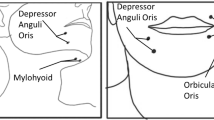Abstract
Exoskeleton devices based on speech systems are often affected by noise in the actual working environment, which reduces the recognition rate of speech systems. In order to reduce the influence of noise on the speech system, this paper proposes using joint features of Mel Frequency Cepstrum Coefficients and Gammatone Frequency Cepstrum Coefficients. Then, an improved Fast Correlation-Based Filtering algorithm is used to perform dimensionality reduction and remove irrelevant and redundant features in the joint features to obtain the optimal feature subset. Finally, the experiments show that the feature recognition effect is greatly improved after dimensionality reduction is performed under a low signal-to-noise ratio.
Access this chapter
Tax calculation will be finalised at checkout
Purchases are for personal use only
Similar content being viewed by others
References
Biswas, M., Rahaman, S., Ahmadian, A., et al.: Automatic spoken language identification using MFCC based time series features. Multimed. Tools Appl. 82, 9565–9595 (2023)
Li, Q., et al.: MSP-MFCC: energy-efficient MFCC feature extraction method with mixed-signal processing architecture for wearable speech recognition applications. IEEE Access 8, 48720–48730 (2020)
Shi, X., Yang, H., Zhou, P.: Robust speaker recognition based on improved GFCC. In: IEEE 2016 2nd IEEE International Conference on Computer and Communications (ICCC), Chengdu, China, pp. 1927–1931 (2016)
Wang, H., Zhang, C.: The application of Gammatone frequency cepstral coefficients for forensic voice comparison under noisy conditions. Aust. J. Forensic Sci. 52, 1–16 (2019)
Dua, M., Aggarwal, R.K., Biswas, M.: Optimizing integrated features for Hindi automatic speech recognition system. J. Intell. Syst. 29(1), 959–976 (2018)
Dua, M., Aggarwal, R.K., Biswas, M.: Performance evaluation of Hindi speech recognition system using optimized filterbanks. Eng. Sci. Technol. Int. J. 21(3), 389–398 (2018)
Li, Z., Yao, Q., Ma, W.: Matching subsequence music retrieval in a software integration environment. Complexity 2021, 1–12 (2021)
Deng, X., Li, M., Wang, L., et al.: RFCBF: enhance the performance and stability of fast correlation-based filter. Int. J. Comput. Intell. Appl. 21(02), 2250009 (2022)
Zaffar, M., Hashmani, M.A., Savita, K.S., et al.: Role of FCBF feature selection in educational data mining. Mehran Univ. Res. J. Eng. Technol. 39(4), 772–778 (2020)
Muralishankar, R., Ghosh, D., Gurugopinath, S.: A novel modified Mel-DCT filter bank structure with application to voice activity detection. IEEE Signal Process. Lett. 27, 1240–1244 (2020)
Zhao, X., Shao, Y., Wang, D.L.: CASA-based robust speaker identification. IEEE Trans. Audio Speech Lang. Process. 20(5), 1608–1616 (2012)
Acknowledgement
I would like to express my heartfelt thanks and sincere respect to Mr. Wenjie Chen. He has always encouraged me to continue to learn knowledge with his persistent pursuit of science, practical and realistic work attitude, generous and humble approach and selfless dedication. I also thank the National Natural Science Foundation of China (51975002) for its support.
Author information
Authors and Affiliations
Corresponding author
Editor information
Editors and Affiliations
Rights and permissions
Copyright information
© 2023 The Author(s), under exclusive license to Springer Nature Singapore Pte Ltd.
About this paper
Cite this paper
Su, Z., Chen, W., Sun, X., Ding, N., Zhi, Y. (2023). A Feature Extraction Algorithm for Exoskeleton Speech Control System Based on Noisy Environment. In: Yang, H., et al. Intelligent Robotics and Applications. ICIRA 2023. Lecture Notes in Computer Science(), vol 14268. Springer, Singapore. https://doi.org/10.1007/978-981-99-6486-4_32
Download citation
DOI: https://doi.org/10.1007/978-981-99-6486-4_32
Published:
Publisher Name: Springer, Singapore
Print ISBN: 978-981-99-6485-7
Online ISBN: 978-981-99-6486-4
eBook Packages: Computer ScienceComputer Science (R0)




